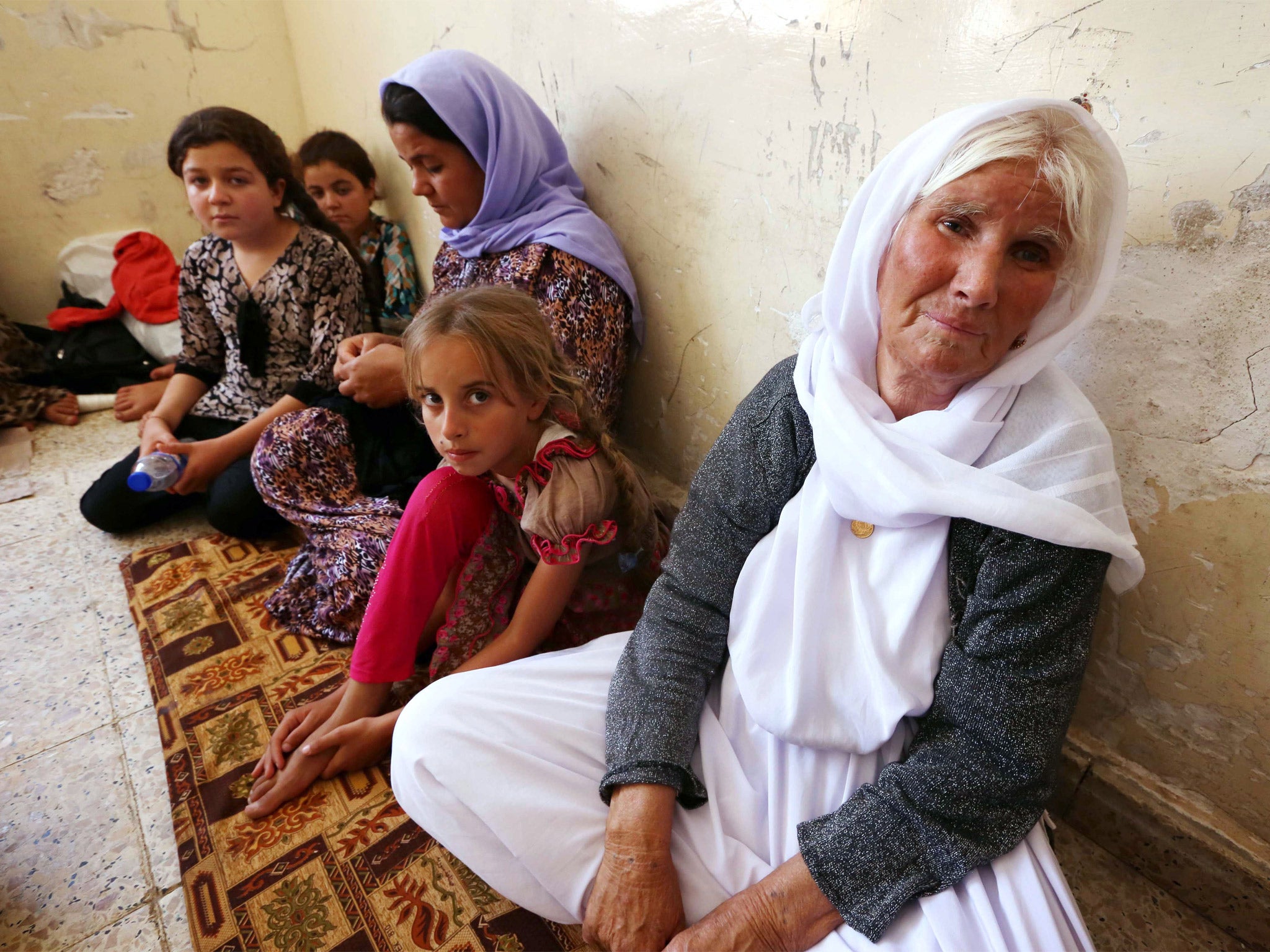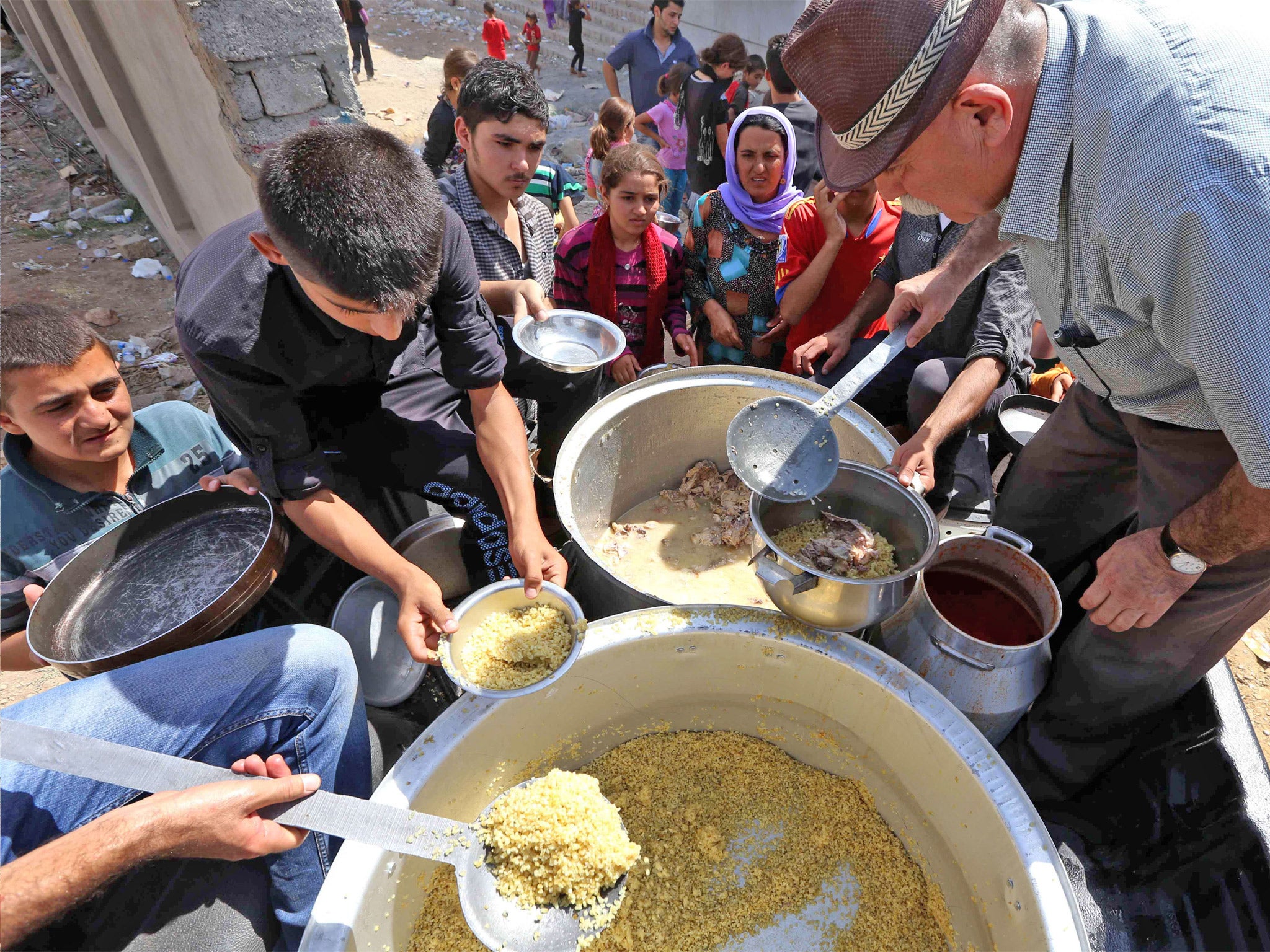Isis fighters trap thousands of Iraqis up a mountain – and they're dying of thirst
Most of those stranded have run out of battery life on their mobile phones, but the few who can still communicate give grim updates

Stranded on a barren mountaintop, thousands of minority Iraqis are faced with a bleak choice: descend and risk slaughter at the hands of the encircled Sunni extremists – or remain where they are and risk dying of thirst.
Humanitarian agencies have estimated that between 10,000 and 40,000 civilians remain trapped on Mount Sinjar since being driven out of surrounding villages and the town of Sinjar on Sunday.
But the mountain that had looked like a refuge is becoming a graveyard for their children.
Unable to dig deep into the rocky mountainside, displaced families said they have buried young and elderly victims of the harsh conditions in shallow graves, their bodies covered with stones. Iraqi government planes attempt to drop bottled water onto the mountain, but have so far reached few of those marooned.
“There are children dying on the mountain; on the roads,” said Marzio Babille, Iraq representative for the United Nations Children’s Fund (Unicef). “There is no water, there is no vegetation, they are completely cut off and surrounded. It’s a disaster, a total disaster.”
Most of those who fled Sinjar are from the minority Yazidi sect, which melds parts of ancient Zoroastrianism with Christianity and Islam. They are considered by the al-Qa’ida-inspired Islamic State of Iraq and the Levant (Isis) to be devil worshippers and apostates.
The dramatic advance of the extremist Sunni fighters has torn apart the ethnic and religious fabric of the country, with Christians and Shia also uprooted from cities and towns.
The Isis takeover of Sinjar, the first major setback for Kurdish forces protecting the country’s north, sent about 200,000 people fleeing, according to the UN. Some 147,000 have arrived in the semi-autonomous Kurdish region, flooding refugee camps. Most of those stranded on Mount Sinjar had run out of battery life on their mobile phones by Tuesday this week, but the few who could still communicate gave grim updates.

Shihab Balki, 23, who was trapped with his mother, sister and four brothers, said 10 children and one elderly woman died on Tuesday, while a day before, seven children perished.
“I saw their bodies with my own eyes.” He later texted the news of another casualty: a young man who had died of thirst, leaving his wife and five children behind. Unicef said that 40 children had died after being displaced from their homes in the area in the 48 hours to Monday night, including an unknown number on the mountain.
In Baghdad, politicians expressed their dismay at the plight of the displaced.
She was referring to reports of the mass murder of those who had stayed behind. Isis, which is now calling itself the Islamic State, posted the first pictures of its capture of Sinjar on social networking sites on Tuesday. One showed six men lying in a field, a pistol pointed at the backs of their heads. “Kill them wherever you find them,” read the caption.
Salem al-Sinjari, 45, said he saw around 25 bodies piled in the streets of Sinjar as he fled. His mother, five brothers and two sisters wound up besieged on the mountain. He said that he had last spoken to them on Monday.
The Iraqi Kurdish security forces, known as peshmerga, are attempting to secure a road from the mountain to the nearby city of Rabia, but the process involves clearing villages where locals are sympathetic to the militants, said Majid Shingali, another local parliamentarian, who left Sinjar over the weekend.
Kurdish factions in neighbouring Syria say that they are entering Iraq to assist the country’s Kurds as they face Isis along a 650-mile front.
The Kurdistan Workers’ Party, which is designated a terrorist organisation by the United States for its armed struggle against the Turkish state, has also called for all Kurdish factions to unite against the Sunni extremists.
Today, the peshmerga attacked Isis fighters 25 miles south-west of the Kurdish regional capital of Erbil in northern Iraq. “We have changed our tactics from being defensive to being offensive. Now we are clashing with the Islamic State (Isis) in Makhmur,” said Jabbar Yawar, secretary-general of the ministry in charge of the Kurdish fighters.
He said that “urgent international action” was needed to save those trapped on the mountain.
“Many of them, mainly the elderly, children and pregnant women, have (already) died,” he said.
Marzio Babille, Unicef’s Iraq representative, said that UN agencies have offered the Iraqi government technical assistance with airdrops but have yet to be asked for help.
At least 15 to 20 flights would be needed, just to provide those stranded with enough water and supplies to survive for a week, he said.
“We need to get them out,” he said. “If we don’t, it would be catastrophic.”
© Washington Post
Join our commenting forum
Join thought-provoking conversations, follow other Independent readers and see their replies
Comments
Bookmark popover
Removed from bookmarks